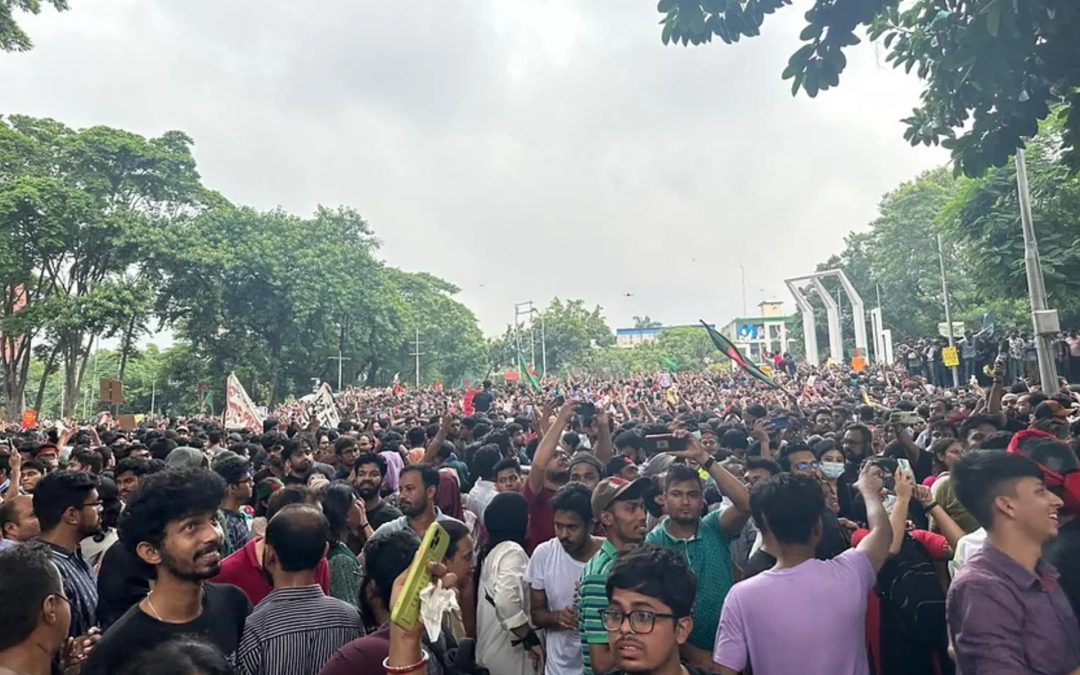On Saturday, thousands of people gathered at the Shaheed Minar, the iconic landmark of the nation’s capital, to demand the establishment of a student movement against discrimination. | Photo: Prothom Alo
A People-Powered Movement
It is never acceptable to remain silent at such a moment of injustice.
History has shown that when the voice of the people unites, it becomes a force no one can ignore.
Bangladesh is currently at a crucial juncture, as both students and citizens are uniting to advocate for justice, equality, and accountability.
This unity is embodied by the Anti-Discrimination Student Movement’s bold initiative—the “March to Dhaka.”
Scheduled for Monday, August 5, 2024, this march symbolizes hope, resistance, and the relentless pursuit of a better future.
The Urgency Behind the Change
Initially planned for Tuesday, the date of the “March to Dhaka” was rescheduled to Monday due to a critical reassessment of the political climate.
Asif Mahmud, the movement’s coordinator, issued a clarion call on Sunday, urging students and citizens from across the nation to converge on Dhaka.
In his statement, Mahmud said, “After reviewing the current situation, we have made an urgent decision to advance our march. We invite students and the public from all over the country to come to Dhaka tomorrow and join the cause.”
This swift change underscores the immediacy of their mission.
The organizers aim to leverage the growing discontent and make their demands clearly heard in the heart of Bangladesh’s capital.
A Stand Against Injustice
The movement’s leadership has been unflinching in its critique of the current administration.
Addressing the nation, Asif Mahmud accused the government of being complicit in the loss of innocent lives.
The acts of the government were responsible for the deaths of a great number of children and adults, he said.
Right now is the moment for us to provide a definitive response.
It is imperative that everyone, particularly those from neighboring provinces, arrives in Dhaka as soon as possible.
Provide support to the people and children who place a high importance on freedom.
This movement is not just a protest; it is a call for accountability.
It demands answers for the alleged suppression of voices and the silencing of dissent.
People view the “March to Dhaka” as a pivotal moment in this collective fight for justice.
A Vision for a New Bangladesh
At its core, the “March to Dhaka” is about creating a new Bangladesh—one founded on equality, freedom, and hope.
Asif Mahmud’s words resonate deeply: “This student-citizen rebellion is nearing completion. To be a part of history, visit Dhaka. We shall all work together to establish a new Bangladesh.”
People across the country have resonated with this vision.
It is a vision that transcends political affiliations and unites individuals under a shared goal of a fairer and more inclusive society.
Verdict: The Moment to Rise
Movements like these define a nation’s character and set the course for its future.
The “March to Dhaka” is not merely a march; it is a declaration of resilience and unity against systemic injustice.
As the streets of Dhaka fill with the footsteps of students and citizens, the message is clear: the people of Bangladesh will no longer stand idle in the face of discrimination and oppression.
This historic moment reminds us all that change is only possible when ordinary people take extraordinary steps.
The “March to Dhaka” is one such step—a powerful testament to the strength of unity and the undying spirit of a nation yearning for justice.
It is a call to action, a demand for change, and a pledge to create a brighter future for Bangladesh.
Let history bear witness to this day, for it is a day when the people of Bangladesh chose courage over fear, action over apathy, and hope over despair.

